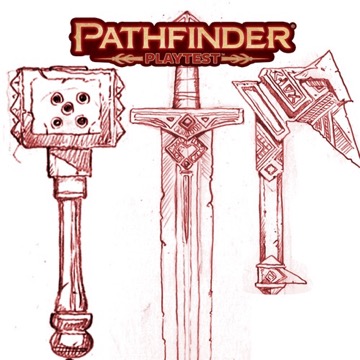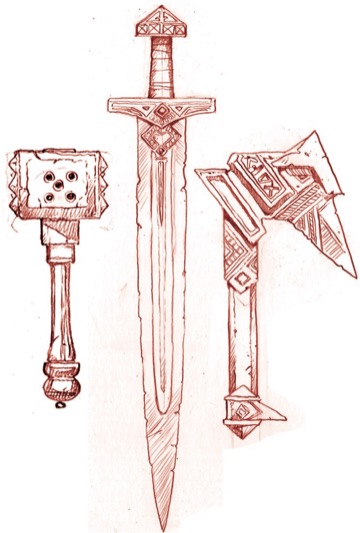In the Pathfinder Playtest Rulebook, when you roll your d20, there's more than just success and failure on the line. You can also critically succeed or critically fail at a variety of checks, from attack rolls, to saving throws, to skill checks and beyond. Rules like these have always been a part of Pathfinder—for example, if you fail a Climb check by 5 or more you fall, and if you fail a Disable Device check by 5 or more you set off the trap—but they are uncommon and not universally applied. In the playtest, we have a unified mechanic.
The Four Degrees of Success
In Pathfinder Second Edition, every check is rolled against a particular DC. Your roll on the d20 + your proficiency modifier + your ability modifier + all your relevant modifiers, bonuses, and penalties make up your check result. If your check result meets or exceeds the target DC, congratulations! You succeeded, and you might have critically succeeded. Otherwise, you failed. If you exceeded the target DC by 10 or more, or if you rolled a natural 20 and met or exceeded the target DC, then you critically succeeded. If your result was 10 or more lower than the target DC, or if you rolled a natural 1 and didn't meet the target DC, then you critically failed. Collectively, success, critical success, failure, and critical failure are called the four degrees of success. You can gain special abilities that increase or decrease your degree of success, often due to having a high proficiency rank. For instance, if your class grants you evasion, you get master proficiency in Reflex saves and treat any success on a Reflex save as a critical success!
Examples
Let's start with a fireball spell. In Pathfinder First Edition, if you succeed the Reflex save, you take only half damage, and evasion allows you to take no damage on a successful save. In Pathfinder Second Edition, here are the degrees of success for fireball (and many of its old friends like lightning bolt and cone of cold) in the playtest.
- Success Half damage
- Critical Success No damage
- Failure Full damage
- Critical Failure Double damage
Any character who critically succeeds takes no damage, and characters with evasion count their successes as critical successes. What about someone legendary at Reflex saves with improved evasion? They count critical failures as failures and thus can never suffer the deadliest effects of a Reflex save, even on a natural 1!
Not all effects list all four degrees of success. If an effect doesn't list a critical success entry, that means there is normally no special effect for critically succeeding, so you just use the result for a success. Similarly, if an effect doesn't list a critical failure entry, there is normally no special effect for critically failing, so you just use the result for a failure. If a success entry is missing, that means nothing happens on a success, and if a failure entry is missing, that means nothing happens on a failure. Let's take a look at an example that combines two of these rules: the results of a basic attack called a strike.
Success You deal damage, which equals the weapon's or unarmed attack's damage dice plus your Strength modifier if it's a melee attack, plus any bonuses.
Critical Success You deal double damage—you roll twice as many damage dice and add double the ability modifier and double any other bonuses to damage.
Let's unpack what this means. You deal damage on a success and double damage on a critical success. Since there is no failure entry, that means normally nothing happens on a failure, and since there is no critical failure entry, that means a critical failure has the same effect as a failure, so nothing happens. But the fighter might have something to say about that! The fighter can use the special certain strike action, which lets him strike with the following failure effect.
Failure Your attack deals the minimum damage. (Treat this as though you had rolled a 1 on every die.)
So with certain strike, a failed attack roll isn't actually a miss—your fighter is so skilled that you still get a glancing blow on a failure and miss entirely only on a critical failure! Meanwhile, a fighter with the twin riposte reaction can use one weapon to parry and attack with the other weapon whenever an enemy critical fails an attack roll.
Save or Lose
One of the effects of the four degrees of success that adds the most fun to the game is what this means for save or lose effects—effects where if you fail your save, you're unable to continue the fight. These sorts of effects are tricky in almost every roleplaying game, and Pathfinder is no exception. In Pathfinder First Edition, even if your character has a 75% chance of succeeding at your Will save against a mummy's paralysis, chances are pretty high that four mummies are going to paralyze you. (Thanks a lot for that encounter in your Pathfinder Society Scenario, Jason!)
It's tempting to just decide the solution is not to have save or lose effects, but that really cuts off a wide variety of classic feats, monster abilities, and spells from the game. The flip side of those abilities is that if they don't just win, chances are that many of these effects are just wasting a turn. So you either cast the save or lose spell and win, or you cast it and waste the turn. Having those as the only two outcomes is not a great proposition, and of course, players and GMs often maximize their DCs and saving throw bonuses in order to tilt the outcome to their side as much as possible.
But with four degrees of success, suddenly the design space broadens significantly. You can still suffer an effect that takes you out of the action entirely on a critical failure, and you can completely ignore the effect on a critical success. But on a failure, you suffer a powerful effect but not one that takes you entirely out of the fight in one go, and even on a success, you suffer a milder effect that is still useful for the spell's caster. For example, if you critically fail your save against dominate, you are completely under the spellcaster's control, but if you only fail, you can try to break out of the effect each round. On a successful save, you aren't controlled, but you still lose an action on your next turn as you struggle to fight off the mental commands, which could be a serious problem—you might not be able to step away before casting a spell, or have time to raise a shield.
Some Mysterious Critical Effects
I'm closing out with some cool critical effects that result from critical successes on your attack rolls or skill checks or from critical failures on your enemy's saving throws. See if you can figure out where they come from!
- The creature is banished and can't return to your home plane by any means for 1 week.
- The creature takes the full collapse damage and falls into a fissure.
- The target believes the fact for an unlimited duration.
- The target's intellect is permanently reduced below that of an animal, and it treats its Charisma, Intelligence, and Wisdom modifiers as –5. It loses all class abilities that require mental faculties, including all spellcasting. If the target is a PC, she becomes an NPC under the GM's control.
- The creature is pushed 30 feet in the direction of the wind, is knocked prone, and takes 2d6 bludgeoning damage.
- You grant a +4 circumstance bonus.
- Per a failure, except the target believes that everyone it sees is a mortal enemy. It uses its reactions and free actions against these enemies regardless of whether they were previously its allies, as determined by the GM. It otherwise acts as rationally as normal and will likely prefer to attack enemies that are actively attacking or hindering it.
- The target must succeed at a Fortitude save or die. Even on a successful save, the target is frightened 2 and must flee for 1 round.
- Your target regains Hit Points equal to 2d10 + your Wisdom modifier.
- Per a success, but even afterward, the target is too scared of you to retaliate against you.
Mark Seifter
Designer











